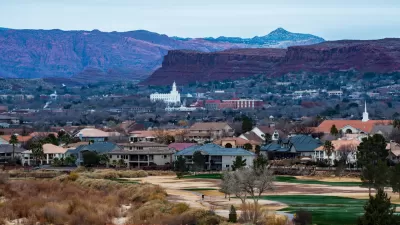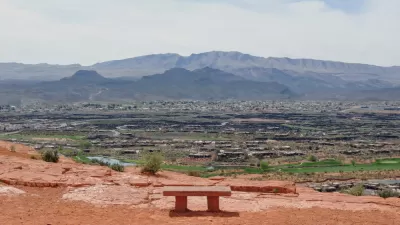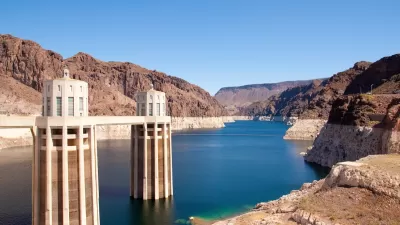After a year of contentious negotiations, Western states dependent on the river’s water supply are nearing a deal that would reduce water use significantly over the next three years.

California, Arizona, and Nevada are close to reaching a deal to protect the Colorado River’s threatened water supply. According to an article by Joshua Partlow in The Washington Post, the Lower Basin states have so far been reluctant to submit feedback on the federal government’s proposed alternatives, claiming they can come to an agreement of their own.
As Partlow explains, “The consensus emerging among these states and the Biden administration aims to conserve about 13 percent of their allocation of river water over the next three years and protect the nation’s largest reservoirs, which provide drinking water and hydropower for tens of millions of people.”
The proposed deal would cut back roughly 3 million acre-feet of water in the next three years in exchange for federal funding from the Inflation Reduction Act. Despite contentious negotiations between California and Arizona, the river’s top users, over the past year, “these states now appear more united than ever and are closing their differences with the federal government, even as significant issues remain unresolved.”
After a historically wet winter, the river’s reservoirs are in less dire condition than they were last year, but officials from Upper Basin states (Colorado, New Mexico, Utah and Wyoming) want to see more binding commitments to conservation from Lower Basin states. Becky Mitchell, Colorado’s representative in the negotiations, insists that the states need to reevaluate their relationship with the river, saying that “the enemy is not any organization, agency or part of the basin.” Rather, “The enemy is the old way.”
More background on the Colorado River crisis:
FULL STORY: States near historic deal to protect Colorado River

Maui's Vacation Rental Debate Turns Ugly
Verbal attacks, misinformation campaigns and fistfights plague a high-stakes debate to convert thousands of vacation rentals into long-term housing.

Planetizen Federal Action Tracker
A weekly monitor of how Trump’s orders and actions are impacting planners and planning in America.

San Francisco Suspends Traffic Calming Amidst Record Deaths
Citing “a challenging fiscal landscape,” the city will cease the program on the heels of 42 traffic deaths, including 24 pedestrians.

Defunct Pittsburgh Power Plant to Become Residential Tower
A decommissioned steam heat plant will be redeveloped into almost 100 affordable housing units.

Trump Prompts Restructuring of Transportation Research Board in “Unprecedented Overreach”
The TRB has eliminated more than half of its committees including those focused on climate, equity, and cities.

Amtrak Rolls Out New Orleans to Alabama “Mardi Gras” Train
The new service will operate morning and evening departures between Mobile and New Orleans.
Urban Design for Planners 1: Software Tools
This six-course series explores essential urban design concepts using open source software and equips planners with the tools they need to participate fully in the urban design process.
Planning for Universal Design
Learn the tools for implementing Universal Design in planning regulations.
Heyer Gruel & Associates PA
JM Goldson LLC
Custer County Colorado
City of Camden Redevelopment Agency
City of Astoria
Transportation Research & Education Center (TREC) at Portland State University
Jefferson Parish Government
Camden Redevelopment Agency
City of Claremont





























